Disney’s Long-Forgotten Direct-To-Video Little Mermaid Prequel Was Footloose Under The Sea
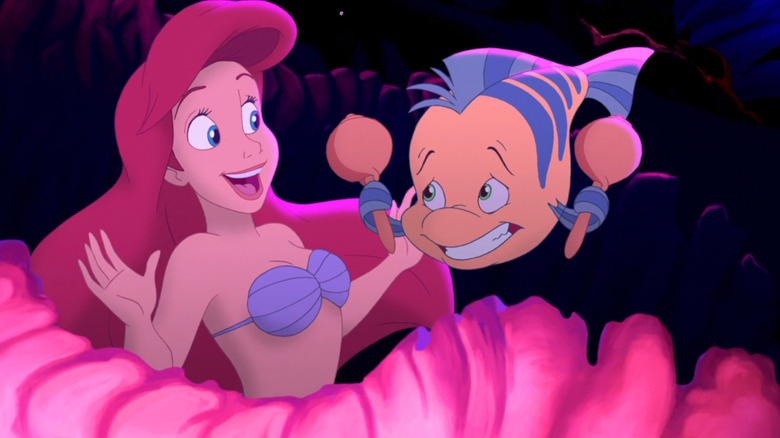
Gather around, everybody, and let me tell you of a magical time. It was the turn of the century, which is really old-timey way of saying just about anytime between about 1990 and 2010, and not every movie Disney made was a gigantic and expensive exploitation of one of its most popular intellectual properties. This was a time when Disney exploited its most popular intellectual properties in smaller and more affordable ways, by making lots of straight-to-video sequels and prequels to hit films like "The Lion King," "Beauty and the Beast," and "The Little Mermaid."
Some might argue that these straight-to-video cash-ins were, you know, cash-ins. They were milking fans of these beloved theatrical releases for everything they were worth, after all, with films that didn't match the original in terms of ambition or, often, craft. But ignore these oft-forgotten films at your peril, because sometimes they were not only good, but also enjoyably weird and a little illuminating.
Case in point: The third film in the "Little Mermaid" franchise, which not only revealed what really happened to Ariel's mother, and not only finally gave her six sisters some personality, but also basically remade the 1980s teen classic "Footloose" with mermaids and crabs.
Magic Mom's Last Dance
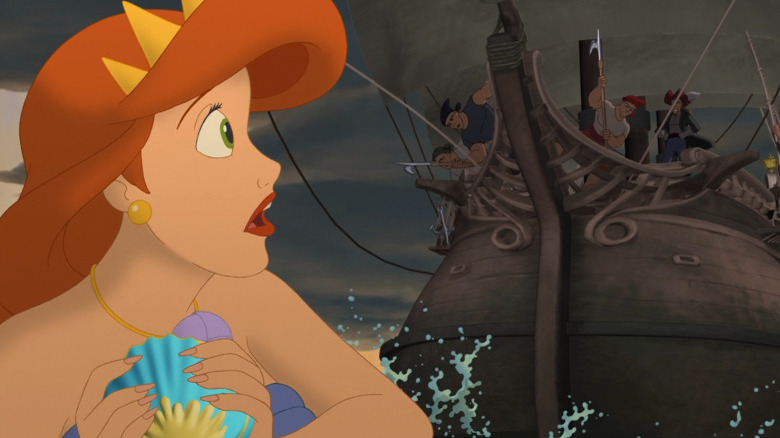
"The Little Mermaid: Ariel's Beginning" begins with the Ariel as very little mermaid indeed. All of King Triton's daughters are young girls, playing with their father in the palace, back when everything in the kingdom of Atlantica was peaceful, happy, and full of song. A weirdly moon-eyed Triton gives his wife, Queen Athena, who looks pretty much exactly like Ariel, a magical music box right before pirates attack their edenic mermaid cove. These monstrous sailors use their evil-looking hooks to swoop up all the Atlanticans' fancy instruments, because that's what pirates do in this universe, and Queen Athena gets smashed between the pirate ship and a sharp rock when she tries to rescue Triton's music box.
As you can imagine, Triton responds with an impassioned "NOOOO!" and makes a fateful decision. No, not to take revenge on the humans, although I suppose he may also have done that off-camera. Instead, Triton outlaws all music in Atlantica, a law which gets rigorously enforced by some pretty fascistic swordfish for ten whole years, until Ariel is old enough to play the lead in an animated riff on "Footloose," which is just a little bit of another familiar dance movie classic.
Dirty Dancing: Atlantica Nights
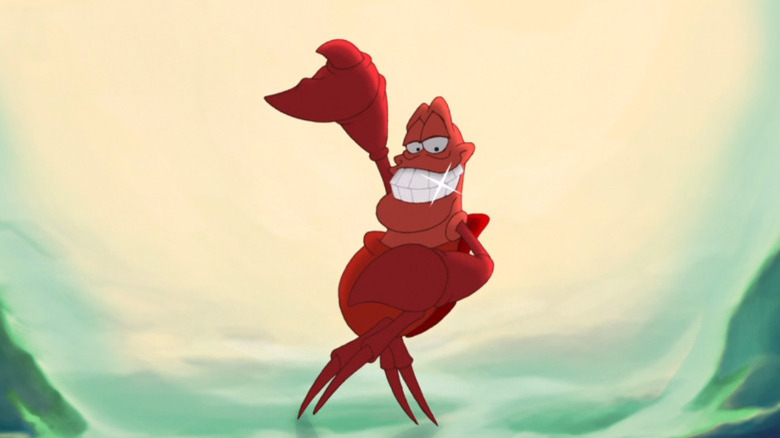
Ariel's the youngest and most rebellious of Triton's daughters, even though they all yearn for a more exciting and less sheltered existence. Their days are micromanaged by a long-suffering governess named Marina Del Rey (two-time Oscar winner Sally Field), who really hates her job and lunges at every opportunity to either steal Sebastian's position as Triton's personal assistant, or convince Triton to punish his daughters in imaginative ways like cutting off all their hair.
Ariel is punished by her father and forced to clean barnacles off Atlantica's architecture, when she runs into Flounder (Parker Goris), who apparently used to be a bit of a bad boy ne'er-do-well, and makes music no matter what the laws are. The two of them are nearly arrested for being a little too melodic, but later that night Ariel follows the renegade Flounder to a secret night club where various fish dare to flaunt Triton's law. And Ariel is very much shocked to see that the master of ceremonies, the main attraction, is none other than professional stick in the mud Sebastian the Crab (Samuel E. Wright).
So basically imagine the scene where Baby wanders into the sexy night spot in "Dirty Dancing," except Johnny Castle is a comic relief crab, which is a little weird. Anyway it all works out. Ariel doesn't have any love interest in this movie, presumably because Disney didn't want anybody shipping her with any character who wasn't Prince Eric, the guy she marries in the theatrical film (and who doesn't show up at all in this prequel).
Breakin' Curfew: Electric Eel Boogaloo
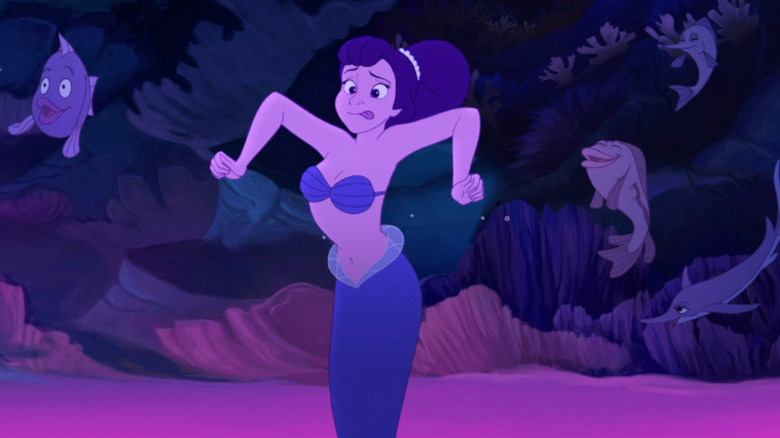
Ariel is sworn to secrecy by the undergro- ... er, underwater night club, but she buckles at the slightest provocation from her sisters Attina, Adella, Alana, Andrina, Aquata, and Arista. When they find out Ariel's been sneaking out in the middle of the night to break the law they have distinct, individual responses, and it's impressive the way this relatively short film gives them all fun personalities. One of them is boy-crazy, and just wants to meet hot mer-guys. Two of them are terrified. Another is paranoid because she can't dance, and when somebody finally drags her onto the dance floor, she proves it by doing the mer-person version of "The Elaine" from "Seinfeld."
The original songs in "The Little Mermaid: Ariel's Beginning" are a bit underwhelming; one imagines that's probably a big reason why the film leans heavily on classic Harry Belafonte songs like "Jump in the Line" and "Man Smart (Woman Smarter)" because those tunes will always be cool until the end of time. And that's not hyperbole. That's just how music works, how Harry Belafonte works, and how time works.
But Marina Del Rey finds out the princesses are breaking the rules, and so is Sebastian, so she gets him arrested and steals his job. To paraphrase one of the funniest "Kids in the Hall" sketches, she swiftly goes mad with the very moderate amount of power Triton gave her, and winds up reliving famous moments from the first "Little Mermaid" and sending her pet electric eels to kill Sebastian, Ariel, Flounder, and the night club's jazz band after they escape from prison.
You Got Surfed
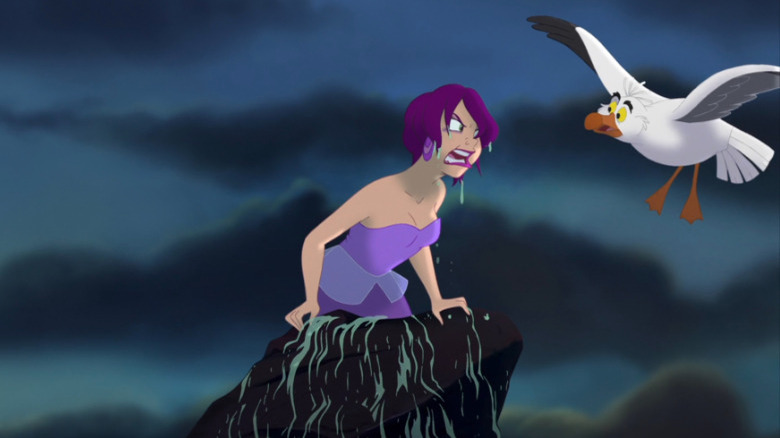
Towards the end of "The Little Mermaid: Ariel's Beginning," it becomes abundantly clear that the filmmakers were running out of ideas. You can tell because several characters in the film say it out loud. Sebastian's plan to solve all their problems is to go to a place where Queen Athena's music box might theoretically have wound up after ten years and just kinda hope Ariel finds it. If she does, he'll suggest that she show it to the king, in the hopes that it'll soften his heart and he'll repeal ten years of legal precedent.
When the jazz band finds out that this is literally the plot for the rest of the film, they all bow out because, come on ... that's really flimsy.
But it's what they went with anyway, so naturally it works out for everybody. They stop the electric eels, they show Triton the music box, and Triton is like, "Oh yeah, my wife did like music, didn't she?" (paraphrased) and music gets decriminalized and everything turns out great forever and Ariel no longer has any need to rebel against her father. Until the next time that happens and Triton overreacts, because apparently he never learns a danged thing.
"Ariel's Beginning" was the last straight-to-video animated sequel/prequel of the era, but it's a good send-off. It's a fun riff on "Footloose," that other movie where someone died and a grieving dad outlawed dancing for everybody just because dancing was tangentially involved. The character animation, especially on Marina Del Rey, is impressively expressive, and Marina herself is one of the better late-era Disney villains. Who can't sympathize with being driven up the wall by a thankless job? It's like she was written for babysitters to relate to, after they've watched their umpteenth Disney flick with kids who refuse to go to bed on time.
Sea it today!
Read this next: The Best Kids' Animation Of 2022
The post Disney's Long-Forgotten Direct-to-Video Little Mermaid Prequel Was Footloose Under the Sea appeared first on /Film.